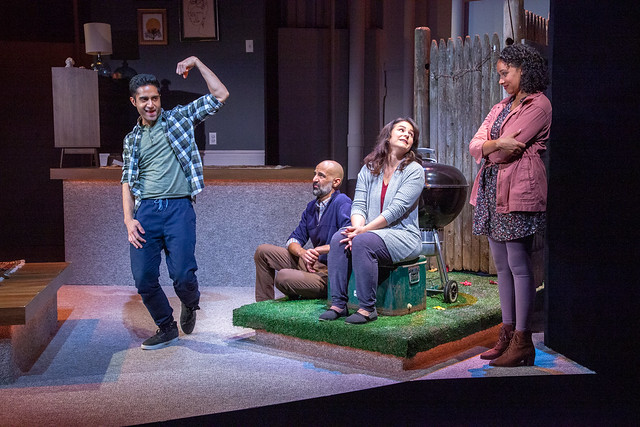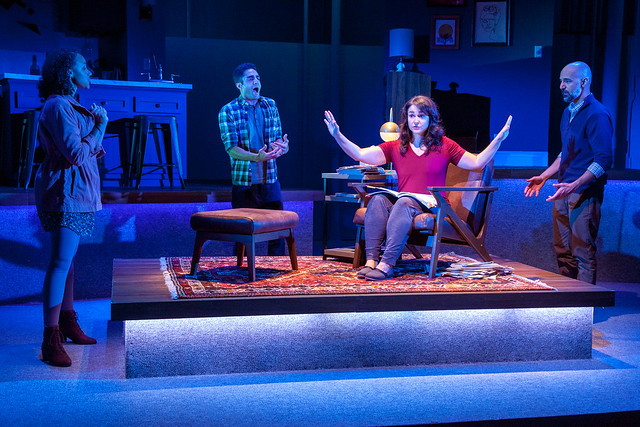
Shravan Amin, Nael Nacer, Lori Prince and Caroline Strang. Photo by Meghan Moore.
Presented by Merrimack Repertory Theatre
Based on the book by Cheryl Strayed
Adapted for stage by Nia Vardalos
Co-Conceived by Marshall Heyman, Thomas Kail and Nia Vardalos
Directed by Jen Wineman
September 11 – October 6, 2019
Merrimack Repertory Theatre
Lowell, MA
MRT on Facebook
Review by Shiyanbade Animashaun
(Lowell, MA) Tiny Beautiful Things delivers a personal memoir through the vehicle of questions answered by ‘Sugar’, who does so in each case with an insight drawn from a personal story.
Though it boils down questions received by Sugar (Lori Prince) over the years, there is minimal diversity of topics. Trauma through death or abuse, and relationship queries dominated the questions posed by Letter Writer 1-3 (Nael Nacer, Caroline Strang, and Shravan Amin respectively). In each there is a thread of familiarity whether the letter writer is male, female or trans. This familiarity isn’t extended to letters about the experiences of those who might be gay, POC, or disabled and have questions related to that, as they don’t appear to exist.
This was highlighted near the end of the performance where a story about getting kissed at a Mexican restaurant elicited a laugh at the mention of the location, though the story was more about the act of the kiss. I wonder if this was deemed laughable by the audience member in question as it stood in such contrast to earlier tales of ‘helping poor, disenfranchised, white girls’, and the main character refusing to reveal her full name so as not to taint people’s response to her advice due to ‘preconceptions’ about her ‘age, ethnicity, or achievements’. This fit in with the laugh garnered by Sugar admonishing her younger self to not do ecstasy with a ‘sweet but f*****-up gay couple’, an addition made more stark by the lack of diversity in the letters.
On arrival at the Merrimack Repertory Theatre, audiences are struck by a set divided into multiple areas to designate a kitchen, a grill area, a laundry room, etc. All are visible at once, and each got a fair bit of use. However certain physical set pieces doubled for environments one had to imagine. A kitchen is used as a restaurant, a cooler by a grill becomes a front door and stoop. Some, like the laundry room, seemed to have myriad uses as background; plenty of folks do laundry. However, a grill that’s used for physical effect once or twice in the midst of being used as an imaginary landscape seemed odd.
In a similar way, the interactions between Sugar and the Letter Writers shifted from specters reciting the beginnings of questions to the specific person doing the letter writing. At times there were vocal changes or physical mannerisms that shifted per letter and helped the audience follow along. At others there were obvious props or clothing changes. This was infrequent enough to be distracting, especially as the first shift included little of this, and was rather unnoticeable. By the end, I wondered if the tactic played to the actors’ strengths, with Caroline Strang more often deftly altering her voice and physicality, Nael Nacer dipping into a depth of emotions and Shravan Amin more subtly altering his characters from letter to letter.

Caroline Strang, Shravan Amin, Lori Prince and Nael Nacer. Photo by Meghan Moore.
Still, the shifts and interactions played with space and touch in interesting ways. Indicating a mob mentality in the frequency of questions asked while Letter Writer 1-3 railed against Sugar, showing trepidation on the part of a Letter Writer by having them inch closer to Sugar as they asked their questions, or showing their journey to accepting Sugars’ answer in their physical and facial responses as she spoke. The Letter Writers themselves interacted in varying degrees, but never touched Sugar except in two specific moments where she initiated. This let the moments stand out as important.
For an experience of advice given through a personal lens, Tiny Beautiful Things does that with a range of raw emotions, hard topics, and vulnerability. As a play it may be a bit unconventional in its delivery and myopic in the queries of humanity it choses to address.
